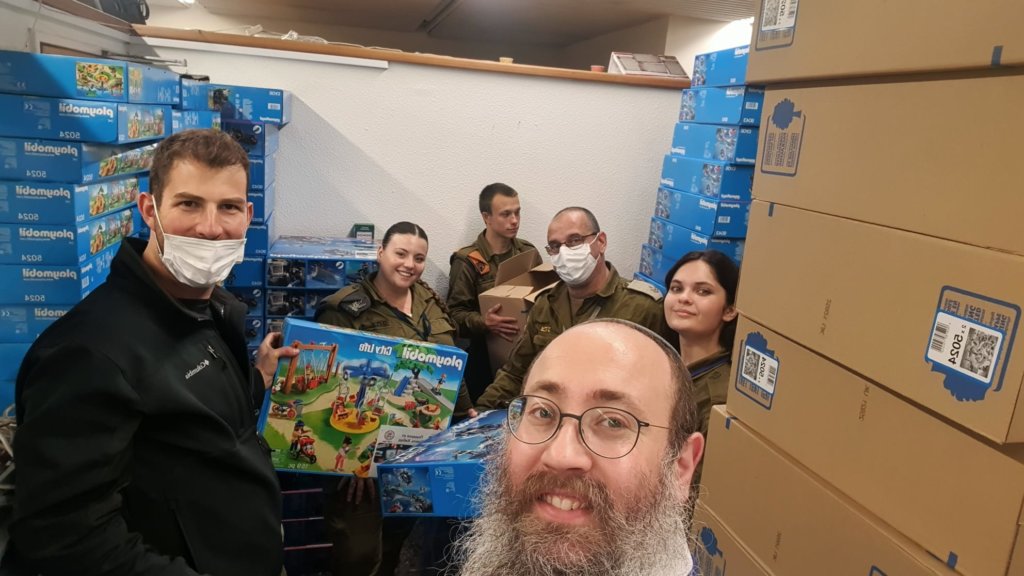Original article published in the JNS
Families typically receive 500 shekels ($155) of food per month, consisting of fruit and vegetables, dry goods and money on a debit card that can be used in supermarkets for perishables, adhering to the specific religious and dietary needs of diverse communities.
(April 13, 2022 / JNS) If Rabbi Menachem Traxler and Pantry Packers only took care of Israel’s poor and hungry in regular times, dayenu—it would be enough. If Pantry Packers only went the extra mile to care for Israel’s needy during the coronavirus pandemic, dayenu. And if they only worked just a bit harder before Pesach—and Ramadan—to help Israel’s needy Jewish, Muslim and Christian residents, dayenu. But when Jews from Ukraine began coming to Israel, Pantry Packers and dozens of volunteers mobilized yet again to help others.
The Austin, Texas-born and Houston-educated Traxler playfully notes: “I came to Israel in 2001, liked the food and stayed.”
Little did he know at the time that he would devote his life to feeding others.
Traxler spent a decade as a Chabad-Lubavitch emissary in Tzfat. He then learned that Colel Chabad was looking for volunteer opportunities in the area of tzedakah.
“I suggested Pantry Packers, now 10 years strong,” reports the rabbi, founder of the nonprofit charity that receives half of its funding from the government of Israel and director of the Jerusalem-based program that provides nutritional support to Israel’s neediest families. He also serves as director of volunteering for Colel Chabad.

Pantry Packers is well-known throughout Israel. The organization, established in 1788, is the food-distribution arm of Colel Chabad, Israel’s longest-running network of social services, established in 1788.
The extensive Pantry Packers network provides a range of assistance, including monthly delivery of non-perishable household food items to 10,346 families in 48 cities in need of nutrition security. Each month, it supports 1,750 seniors and 24,500 children. Families are screened and selected on a non-discriminatory basis by the social-services departments of local municipalities without regard to gender, ethnic background or degree of religious observance.

Families typically receive 500 shekels ($155) of food per month, consisting of fruit and vegetables, dry goods and money on a debit card that can be used in supermarkets for perishables.
The organization shows great sensitivity to the specific religious and dietary needs of the diverse communities it serves. “It is super-important when we give tzedakah that we give a person what he needs,” says Traxler. “When we give Muslim families food during Ramadan, for example, we add dates; it is an important pre-fast staple.”
Traxler explains that they learned from social workers serving the Ethiopian Jewish community that the rice, beans and pasta Pantry Packers were providing was not meeting the needs of the community. “We started providing teff flour [the main ingredient in the staple food injera, a sourdough flatbread] and green coffee.” The foods they provide to Israel’s haredi community cater to their dietary needs as well.
‘They call and say what they need‘
Thousands of school groups, camp groups and families from Israel and abroad volunteer each year at the Pantry Packers packing plant in Jerusalem.
Michelle Kofman of New York City reports: “We had a wonderful experience at Pantry Packers as part of the celebration of our son’s bar mitzvah. Our group, ranging from ages 7 to 77, worked together and had a lot of fun. While we had services, meals and tours, this activity uniquely integrated actively doing a mitzvah.”
She says that the “explanation and video at the beginning helped us to understand the problem of food insecurity in Israel, and we could see the direct impact of our packaging and contribution. Knowing that the food we bagged and packed was going directly to hungry families helped us appreciate all that we have and our ability to do for others. It was a very special part of our trip to welcome our son into Jewish adulthood, along with the values of chesed and tzedakah.”

In addition to providing food to Israel’s food insecure, Colel Chabad operates a chain of nonprofit supermarkets in key markets to serve households struggling with the cost of food; delivers 845 daily meals on wheels meals; and serves free meals at a network of 22 restaurants.
The recent coronavirus pandemic provided singular challenges and opportunities for Pantry Packers. “COVID—we were off the books!” reports Traxler. “There was an explosion. We were serving the elderly, and the government was issuing food cards and using our platform to reach people in need.”
In addition, Traxler notes that they were delivering groceries anytime a person in Jerusalem tested positive for the virus.
In recent weeks, Colel Chabad and Pantry Packers have expanded their efforts to serve Ukrainian Jews both before they arrive in Israel and after they land. “The Chabad shluchim in Ukraine are our social workers. They call and say what they need. We have given more than 1,000 families debit cards for housewares, food, linens and clothes,” says Traxler, who has personally greeted new arrivals at Ben-Gurion International Airport on several occasions. “I give out toys to the kids, and roses and cosmetics to the women.”
Now, Traxler and Chabad emissaries are planning a meaningful Passover experience for Ukrainian refugees. They will be reuniting entire communities at various boarding schools that are closed during the holiday, which is celebrated for seven days in Israel as opposed to the eight days in the Diaspora. The cost of providing an all-inclusive Passover experience doesn’t even factor into the conversation, notably with the belief that God will provide.
“Big communal public seders were very important, especially in Ukraine,” says Traxler. “If we can offer them here, I am sure Hashem will send us partners.”

